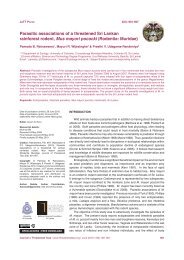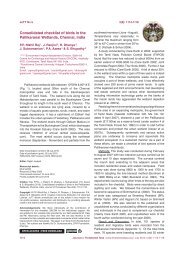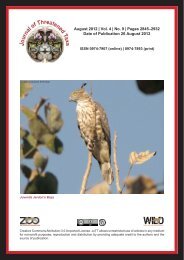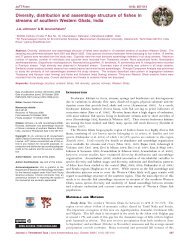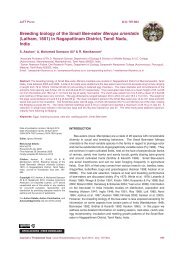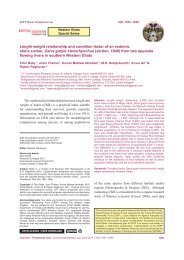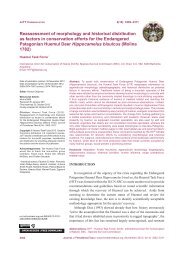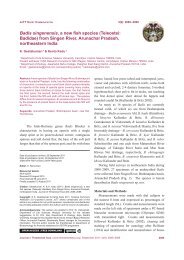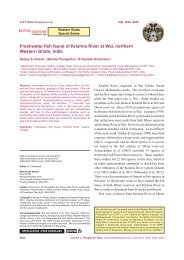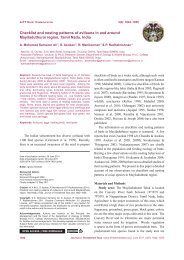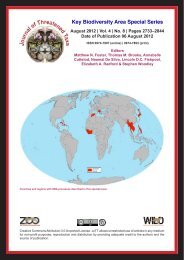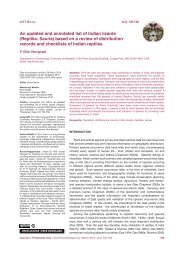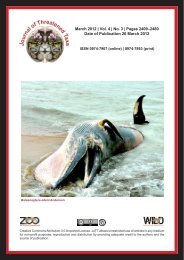Booklet Sept 11.pdf - Journal of Threatened Taxa
Booklet Sept 11.pdf - Journal of Threatened Taxa
Booklet Sept 11.pdf - Journal of Threatened Taxa
Create successful ePaper yourself
Turn your PDF publications into a flip-book with our unique Google optimized e-Paper software.
Invertebrate species conservation<br />
The scope <strong>of</strong> the exercise must be clear from<br />
the start, with clear definition <strong>of</strong> the objectives and<br />
synopses <strong>of</strong> the actions proposed, preferably in<br />
SMART terms (New 2009). A clear sequential process<br />
exists for this, whatever scale is anticipated. Either for<br />
an individual plan or a wider strategy, careful planning<br />
at the outset may pay dividends. Among these, an<br />
objective appraisal <strong>of</strong> what may be gained, and also<br />
<strong>of</strong> what may be lost, through a wider perspective is<br />
wise, together with a frank appraisal <strong>of</strong> the influences<br />
<strong>of</strong> the compromises that may be needed. For example,<br />
evaluation <strong>of</strong> threats for a snail or beetle may be very<br />
different in scale than to a bird or mammal in the same<br />
area, and ameliorative micromosaic management may<br />
become more difficult to pursue. ‘Smart decision<br />
making’, as discussed by Possingham et al. (2001),<br />
is critical but - as they pointed out - few protocols<br />
exist for answering even very basic questions in<br />
conservation management, and perhaps nowhere less<br />
so than for invertebrates. Those protocols that have<br />
been suggested may be based on single cases rather<br />
than on a replicated suite, and on results whose causes<br />
are not fully understood. With insect translocations,<br />
for example, we <strong>of</strong>ten do not know why any particular<br />
exercise succeeds or fails, <strong>of</strong>ten simply because the<br />
outcome is not monitored in sufficient detail (Oates &<br />
Warren 1990).<br />
Despite increasing awareness <strong>of</strong> needs for<br />
invertebrate conservation, and substantial attempts to<br />
‘accentuate the positive and eliminate the negative’,<br />
many <strong>of</strong> the basic points that have arisen have yet to<br />
become established firmly or consistently on political<br />
agendas. Yen & Butcher (1997) noted the perception<br />
impediments for invertebrates that arise from (1) small<br />
size, equated commonly with insignificance; (2) high<br />
diversity and abundance, associated with difficulty<br />
<strong>of</strong> study and with lack <strong>of</strong> vulnerability; (3) adverse<br />
publicity associated with pests, nuisances and general<br />
antagonists to human interests; (4) entomophobia;<br />
(5) their being ‘a low form <strong>of</strong> life’; and (6) innate<br />
reluctance to understand them. The last two points,<br />
among those discussed by Kellert (1993) are commonly<br />
overlooked but important influences and, as Yen &<br />
Butcher emphasised, many <strong>of</strong> these impediments<br />
are encountered by people in early childhood; they<br />
are amongst the most important ‘negatives’ to be<br />
eliminated. Conservation measures and advocacy<br />
for the Elephant Dung Beetle (Circellium bacchus) in<br />
T.R. New<br />
South Africa have helped to change the perspective for<br />
elephants emphasised by Poole & Thomsen (1989),<br />
and similar examples are becoming more frequent.<br />
A successful strategy is one that works! Knowledge<br />
and experience are ‘positives’, but it is all-too-easy<br />
to get distracted by research that is <strong>of</strong> fundamental<br />
scientific interest and value but may not directly focus<br />
on conservation. Many conservation biologists wish<br />
primarily to ‘do science’, and can run risks <strong>of</strong> losing<br />
touch with managers whose priorities are founded in<br />
a different perspective. A strategy cannot be based<br />
on ex cathedra statements: invertebrate conservation<br />
biologists and other scientists are not simply talking<br />
to their peers, but to the global constituency <strong>of</strong><br />
people whose interest and livelihood are affected by<br />
management decisions. Strategies should ideally be<br />
based in truly cooperative endeavour toward realistic<br />
agreed objectives, in a cultural environment in which<br />
invertebrates do not have to be rescued from political<br />
and conservation oblivion.<br />
Perhaps the biggest question to address here is<br />
whether invertebrate species-level conservation has<br />
serious place in future conservation strategy. With<br />
the very real and continuing scientific and logistic<br />
difficulties, would invertebrates indeed be served better<br />
as passengers under any wider umbrella endeavours<br />
to which greater support could then be given If this<br />
approach were adopted, could benefits to invertebrates<br />
even be measured Proponents <strong>of</strong> not focusing<br />
specifically on invertebrates are commonly those who<br />
dismiss them as ‘too difficult’ or ‘too numerous’; their<br />
supporters tend to emphasise the subtle differences in<br />
biology and resource uses flowing from ecological and<br />
taxonomic variety, some citing values as ‘indicators’<br />
in various contexts. Both recognise the intrinsic<br />
difficulties <strong>of</strong> advocacy and garnering effective support<br />
on any wide basis, and the ethical dilemmas that arise<br />
from simply ignoring such major components <strong>of</strong><br />
Earth’s biodiversity. I would urge that we continue to<br />
benefit from the understanding <strong>of</strong> individual species<br />
conservation programmes spanning a substantial<br />
variety <strong>of</strong> invertebrate life forms and life styles, to<br />
facilitate their participation in wider conservation<br />
agendas, and to accept that an important component <strong>of</strong><br />
our job is to make such strategy work.<br />
Careful consideration <strong>of</strong> the issues noted in this<br />
essay, and debate over their worth and feasibility, may<br />
contribute to this end.<br />
2042<br />
<strong>Journal</strong> <strong>of</strong> <strong>Threatened</strong> <strong>Taxa</strong> | www.threatenedtaxa.org | <strong>Sept</strong>ember 2011 | 3(9): 2033–2044



